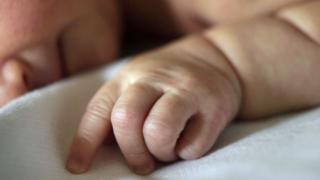[ad_1]

Image copyright
PA Media
More than 7,000 unborn children are recorded as “in need”
Almost one in 50 of those officially classified as “children in need” in England have not yet been born.
More than 7,000 of such vulnerable children have been put into this category before their birth, an analysis of government figures shows.
The number of “unborn” recorded in the total of vulnerable children has almost trebled in the last eight years.
The most common concerns were neglect or abuse – and that children were being born into “dysfunctional families”.
Domestic violence
The Department for Education recently published annual figures showing there were 400,000 so-called “children in need”.
These are children about whom there are concerns about their health or development, and who are at risk of being “significantly impaired” without extra support.
Domestic violence, parents with mental health problems, and drug and alcohol abuse are among the biggest factors.
This could lead to child protection plans or other interventions by social services or local authorities.
But a further analysis of the figures shows a continuing rise in the numbers of pre-birth children who are designated as being of concern.
The figures for 2018-19, show a new high of 7,360 children considered vulnerable before their birth. This figure has risen steadily over recent years from 2,630 in 2010-11.
Image copyright
Getty Images
While the odds might be stacked against some children from an early age, these figures show a sharp rise in those being officially monitored even before their birth.
The Department for Education says unborn children are put on this list because of concerns over their “safety or welfare”, or because of the problems already facing their parents.
“For unborn children, social services will refer cases where there are concerns regarding the parents, carer or other adults in the household,” said a DFE spokesman.
‘Acute stress’
The most recent figures for unborn children in need show “abuse or neglect” to be the biggest concerns, along with “family dysfunction”, “family in acute stress”, “parents’ disability or illness” and “low income”.
“It is absolutely vital that councils are able to support families and help children who are at risk of significant harm, but it is also important that help is available before problems escalate to that point,” said the Local Government Association.
More than 50% of children in need cases, over 200,000 incidents, involved domestic violence.
The Local Government Association also raised concerns about children in need for reasons “linked to faith or belief”, which had risen by 320 to 1,950 cases, representing 0.4% of children in need.
The councils’ group says that some cases could include beliefs in witchcraft or “spirit possession”, but there was no breakdown to show how many.
[ad_2]
Source link

